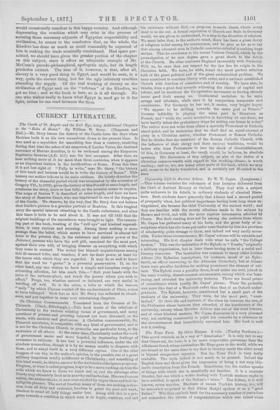CURRENT LITERATURE.
The Castle of St. Angelo and the Evil Eye, being Additional Chapters to the "Rob di Roma," By William W. Story. (Chapman and Hall.)—Mr. Story traces the history of the Castle from the days when Hadrian built it as his own mausoleum down to the present time. It was used as a sepulchre for something lees than a century, receiving during that time the ashes of six emperors, if Lucius Verne, the destined successor of Marcus Aurelius, is to be reckoned among the Emperors. Septimins Severna (AD. 211) was the last occupant. After that, we hear nothing more of it for more than three centuries, when it appears as an important feature in the fortifications of Rome. From this time it is not lost sight of. "Fully to write," says Mr. Story, "the history of this tomb and fortress would be to write the history of Rome." This history our author follows in its main outlines, He brieflysketches the history of the shameful period which was terminated by the accession of Gregory VII., in 1073; gives the history of this Pontiff at some length, and continues the story, more or loss fully, as the occasion seems to require. The reign of Sextus V. is described at some length, and here we have the story of Beatrice Cenci, who was imprisoned in one of the dungeons of the Castle. We observe, by the way, that Mr. Story does not believe that Guido's picture is a genuine portrait of Beatrice. In this tragical story the special interest attaching to the Castle culminates, and after this there is little to be said about it. It was not till 1825 that the original buildings of the mausoleum were brought to light. The remain- ing part of the book, treating of the "evil eye" and kindred supersti- tions, is very curious and amusing. Among these nothing is more strange than the belief, which seems to have survived in almost full force to the present day, in the exietenee and sinister power of the Jettatori, persons who have the evil gift, exercised for the most part, against their own will, of bringing disaster on everything with which they come in contact. The writer has himself acquaintances among this ill-omened tribe, and vouches, if not for their power, at least for the terror with which they are regarded. It may be as well to know that the word for "garter" is a powerful preservative. If, on the other hand, any one wishes to have a simple and harmless recipe for attracting affection, let him mark this,—" Rub your hands with the juice of tho verbena-plant, and touch the iserson whom you wish to affect." Frogs, too, whether natural or imitated, are very useful in warding off evil. So is the onion, a tribe to which the famous " moly " by which Ulysses warded off the enchantments of Circe, seems to have belonged. Such lore as this Mr. Story has collected in alma& ance, and put together in some very entertaining chapters.






























 Previous page
Previous page